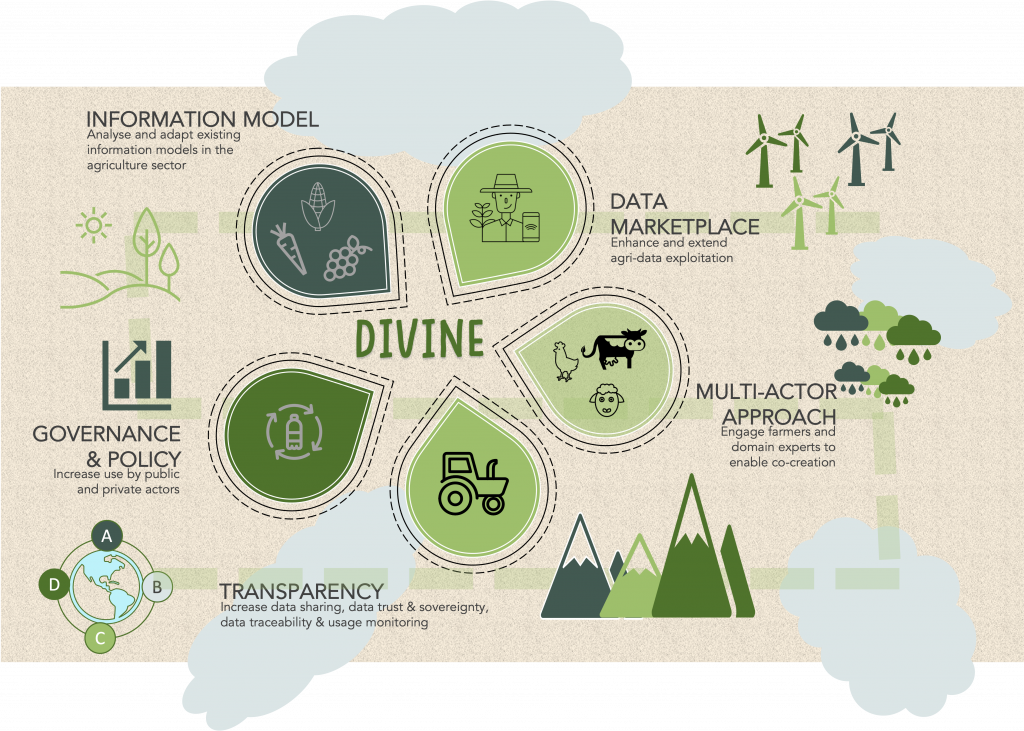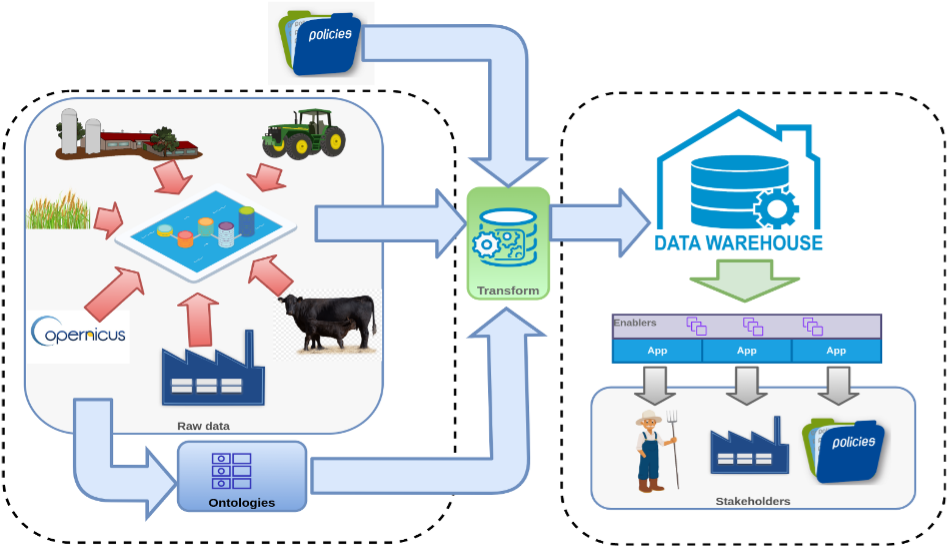
DIVINE is a three-year research project, funded by the European Commission through Horizon Europe’s “Food, Bioeconomy, Natural Resources, Agriculture and Environment” cluster. The project comprises fifteen partners from eight countries and will demonstrate the cost-benefit analysis of data sharing across four pilots ranging from dairy and pork to olives and almonds.
A “Common European Agricultural Data Space” is an EC priority and would enable a single market for data, allowing it to flow within the EU and across sectors. While several authorities and approaches are trying to monitor public and/or private agri-data and manage large-scale data infrastructures (e.g., GAIA-X, IDSA), there nonetheless remains a gap in terms of tools, models, and policies that would allow interaction between agri-data infrastructures and platforms.
Some attempts have been made at interoperability, but major challenges still need to be addressed. These occur at both technological and business levels. On the technology side, the issue relates to the current heterogeneous landscape and the lack of standardisation. On the business side, a broad cost-benefit analysis has not been published on sharing data, which means private data sources in particular, they are hesitant to interact with other stakeholders, whether they are other private companies (potential competitors), regulatory bodies, or academic researchers.

Figure 1: DIVINE overview
Into this impasse comes the DIVINE project which will provide the necessary mechanisms to support interoperability at various levels. The project will define capabilities that ensure trust and increased transparency in data sharing, and therefore, promote best practice in data-driven applications in private and public environments.
DIVINE will create and support an ecosystem that will pilot four real-world agri-data challenges. This will identify and convey synergies coming from data-space ecosystems towards increased data sharing and the creation of new business models. The project’s multi-actor approach will engage stakeholders to ensure collaboration at technical and business levels are at the core of the agri-data ecosystem. At a policy level, DIVINE will closely align with the data needs for the “Farm to Fork” strategy, and the current CAP. Project results will in turn lead to identification of potential regulatory gaps/barriers. In terms of positioning, DIVINE will validate and demonstrate technologies in relevant environments (TRL 5-6) and advance them to prototypes in operational environments (TRL 7). Information Communication Technologies (ICT) and agriculture stakeholders who may adopt these technologies will be engaged by the project to incorporate them into their existing solutions and/or pipeline developments (e.g. pre-commercial or commercial products/services).

Figure 2: DIVINE concept
Pilots
The following pilots will first guide and later demonstrate DIVINE’s technologies:
- Primary produce and carbon: Livestock benchmarking platform for (a) optimising milk and pork production advisory services, and (b) monitoring of carbon footprint on farms.
- Crop yield prediction: What critical data sources can be accessed and are available both from private and public data sources? When these are combined, what additional decision-making can the integrated data stream bring to the supply chain, with respect to the management of a crop?
- Servicing the new CAP: Farm Management Information Systems (FMIS) used by farmers and integrated with public data spaces will provide ground truth evidence in support of new CAP monitoring indicators.
- Olive and almond production: How will data sharing mechanisms enable enhanced monitoring of the agri-environment? Targeted indicators include bioagro use, irrigation, land use, soil quality, harvested yields, cultivation types in the area, etc.
Interdisciplinary
DIVINE is built on an interdisciplinary foundation, reflected in the consortium expertise which ranges from ICT and mathematics, to social science and humanities, and on to economics and behavioural science. The integration of multiple disciplines is complemented by a multisectoral approach. The project will engage practitioners such as farmers and farm organisations, technology providers of Farm Management Systems (FMS), academics and research centres, business and market analysts, and agricultural Ministries and policymakers. Knowledge from these various stakeholders will be recorded and integrated into the project’s work via informal methods such as interviews and roundtable discussions as well as formally via surveys and questionnaires.
Open Science
In the spirit of data sharing and the FAIR principles of data management, DIVINE embraces an open science approach to its work and will implement the following examples:
- Open access: The Sherpa-Romeo initiative will guide the project on its open access policy for targeted Journals and all project outputs will be archived via a ‘community’ on Zenodo
- Open and early sharing of research: The door to the lab will be open at all times. This will create an atmosphere of openness and transparency among both the project researchers and the wider community. The sense of ownership felt by those who helped co- create the results will increase the adoption rate of proposed solutions among stakeholders
- Reproducibility of results: Several strands of results and data will be published to ensure others can reproduce and build on the project’s work, including: (a) raw agri-data from pilots; (b) validation data generated during the project’s work; (c) metadata and support documentation; (d) underlying data from publications
Expected Impacts
DIVINE will have an impact across several aspects of the EU agri-data domain. These include demonstrating the cost-benefit analysis of the four real-world pilots, increasing the transparency of data sharing in the agri-food supply chain, enhancing the uptake of data-capture and digital technologies in the agriculture sector, and strengthening policy and monitoring capacities in both European agriculture and data technologies.
The project kicked off in October, 2022, and runs until September, 2025. It is coordinated by the Institute of Communications and Computer Systems (ICCS) from the National Technical University of Athens (NTUA).
For more see: http://divine-project.eu
 Kieran Sullivan is a data scientist specialising in the agriculture sector. He has been working on EU projects since 2008 across several ICT and data disciplines, and has published papers on 5G, energy efficiency, and machine learning. He is a regular evaluator and rapporteur for EC proposals, as well as a reviewer for funded projects. Kieran is also a part-time beef farmer and journalist.
Kieran Sullivan is a data scientist specialising in the agriculture sector. He has been working on EU projects since 2008 across several ICT and data disciplines, and has published papers on 5G, energy efficiency, and machine learning. He is a regular evaluator and rapporteur for EC proposals, as well as a reviewer for funded projects. Kieran is also a part-time beef farmer and journalist.


